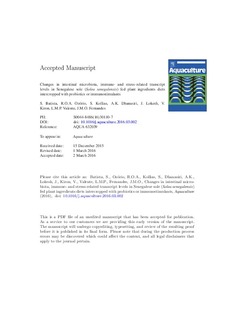Changes in intestinal microbiota, immune- and stress-related transcript levels in Senegalese sole (Solea senegalensis) fed plant ingredient diets intercropped with probiotics or immunostimulants
Batista, Sonia; Ozorio, Rodrigo O.A.; Kollias, Spyros; Dhanasiri, Anusha K.S.; Lokesh, Jep; Kiron, Viswanath; Valente, Luisa M.P.; Fernandes, Jorge Manuel de Oliveira
Journal article, Peer reviewed
Permanent lenke
http://hdl.handle.net/11250/2382242Utgivelsesdato
2016Metadata
Vis full innførselSamlinger
Originalversjon
Batista, S., Ozorio, R.O.A., Kollias, S., Dhanasiri, A.K., Lokesh, J., Kiron, V., ... Fernandes, J.M.O. (2016). Changes in intestinal microbiota, immune- and stress-related transcript levels in Senegalese sole (Solea senegalensis) fed plant ingredient diets intercropped with probiotics or immunostimulants. Aquaculture, 458, 149-157. doi: 10.1016/j.aquaculture.2016.03.002Sammendrag
Senegalese sole (Solea senegalensis) is a highly valued flatfish that grows well with diets containing plant ingredients but their effects on immune competence is still a matter of debate. The current study aimed to examine changes in innate immune parameters and gut microbiota in Senegalese sole fed with 35% or 72% of plant ingredients with or without probiotic or yeast supplementation. Overall, fish fed diets with 72% of plant ingredients showed lower transcript levels of key immune- and stress-related genes in distal intestine, rectum and head-kidney than the 35% diets. In particular, hsp90b mRNA levels in distal intestine were down-regulated by 70% and 60% with the use of high content of plant ingredients in the diet containing the multispecies probiotic and autolyzed yeast, respectively. Denaturing gradient gel electrophoresis showed lower similarity values for distal intestine than rectum. Also fish fed high content of plant ingredients displayed lower similarity values, pointing to a difference in the microbial populations between fish fed different plant ingredients content on the diet. Our data revealed that inclusion of plant ingredients was associated with differences in gene expression and a more diverse microbiota profile but without a significant effect on growth performance. Moreover, probiotic supplementation resulted in up-regulation of hsp90b, gpx, cat and apoa1 transcript levels in distal intestine concomitantly with a growth rate reduction compared to non-supplemented fish.

